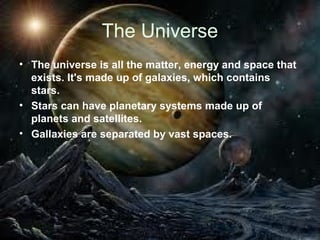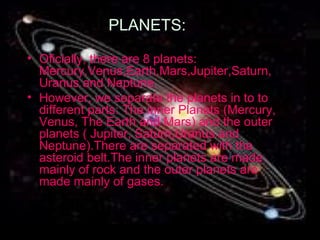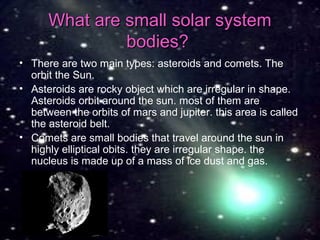Celestial bodies 1eso
- 2. The Universe • The universe is all the matter, energy and space that exists. It's made up of galaxies, which contains stars. • Stars can have planetary systems made up of planets and satellites. • Gallaxies are separated by vast spaces.
- 3. PLANETS: • Oficially, there are 8 planets: Mercury,Venus,Earth,Mars,Jupiter,Saturn, Uranus and Neptune. • However, we separate the planets in to to different parts: The inner Planets (Mercury, Venus, The Earth and Mars) and the outer planets ( Jupiter, Saturn,Uranus and Neptune).There are separated with the asteroid belt.The inner planets are made mainly of rock and the outer planets are made mainly of gases.
- 5. Interesting facts: • 1. 2. 3. 4. 5. 6. 7. • Mercury is the smallest planet and is the clotest to the Sun. Venus rotates in the opposite direction. The Earth is the only planet with life. Mars has a very thin atmosphere. Jupiter is the largest planet, with 63 satellites. Saturn has a system of rings. Uranus axis is almost horizontal. Neptune has the greatest distance from the Sun. We have our main planets, but what about our dwarf planets? The most important dwarf planets are Pluto, Ceres and Eris. Actually, Pluto used to be considered a main planet, but in 2006, the International Union of Astronomers reclassified as a dwarf planet.
- 6. What are small solar system bodies? • There are two main types: asteroids and comets. The orbit the Sun. • Asteroids are rocky object which are irregular in shape. Asteroids orbit around the sun. most of them are between the orbits of mars and jupiter. this area is called the asteroid belt. • Comets are small bodies that travel around the sun in highly elliptical obits. they are irregular shape. the nucleus is made up of a mass of ice dust and gas.
- 7. Hands on • • • • Constellations are imaginary patterns of bright stars. All societies have invented constellations. The Ancient Greeks invented the constellations we call the twelve sings of the zodiac. There are 88 officials constellations. However, most of them do not really look like the mythical figures they represent. The night sky looks different in the Northern and Southern hemispheres. The position of the constellations changes with the seasons because of the movement of the Earth. Some constellations are: and Cassiopeia Orion Ursa major Gemini







